In the audio leaks petition hearing at the Islamabad High Court, Justice Babar Sattar signaled the possibility of issuing a contempt of court notice against the Chairman of the Pakistan Telecommunication Authority (PTA) and its Board members.
This move comes amid ongoing hearings of petitions filed by Najam-ul-Saqib and Bushra Bibi regarding unauthorized audio leaks.
Justice Sattar pointed out the absence of any legal framework authorizing phone tapping, deeming the current practices illegal without a proper mechanism. He emphasized that telecom companies if found providing citizens’ data without appropriate scrutiny, share equal responsibility.
The PTA, in its defense, asserted that it has not granted phone-tapping permissions to any entity and that telecom operators have implemented the system under PTA’s directives. The court has directed the Additional Attorney General to present the minutes of the cabinet meeting that approved the surveillance policy at the next hearing.
During the hearing, Additional Attorney General Munawar Iqbal Duggal explained that authorized officers from intelligence agencies request data. He also mentioned that a new policy, formulated in 2013 following a Sindh High Court decision, allows ISI and IB to directly acquire data from service providers, while other law enforcement agencies can access this data through these intelligence agencies.
Justice Sattar raised concerns about the validity of the Standard Operating Procedure (SOP) issued by a section officer, questioning the authority under which the Ministry of Interior issued the SOP. He queried the legality of sharing live location data without a warrant and highlighted the need to examine the legal status of this document, noting that it does not explicitly mention phone tapping.
Justice Babar Sattar inquired about the functions and working mechanisms of the PTA. The PTA lawyer informed the court that the PTA has no authority for surveillance and does not conduct phone tapping. Justice Babar Sattar questioned the PTA lawyer if they believed that data could be tapped based on a division’s writing. The PTA lawyer responded that it could be done following the cabinet’s approval, as per his understanding.
The court inquired with the telecom companies’ lawyers about how they provide data, whether they keep records of the data they share, and with whom they have agreements regarding the data that comes into Pakistan via cables.
The lawyer informed the court that no one other than the company has access to the data. The court asked if agencies have access to the data without the telecom companies’ permission. Justice Babar Sattar remarked that if any telecom company is assisting in phone tapping, it is illegal, as there is no law permitting phone tapping.
He questioned how a system allowing surveillance could be approved without any law under Section 57. The telecom companies’ lawyer stated that providing data is a condition for telecom operators to obtain a PTA license, and the telecom operators are unaware of how the data is used.
The court asked whether telecom operators installed the system at PTA’s direction and demanded to see the correspondence regarding the PTA’s system installation directive. The lawyer confirmed that it is a license condition and agreed to provide any correspondence records.
The telecom companies’ lawyer also mentioned that authorized agencies could simultaneously access two percent of all telecom company customers’ data. The court questioned whether two percent of the entire country’s telecom operator customers’ data is being accessed and asked how telecom companies are not held responsible when they bear the costs and install the system.
ProPakistani reached out to Pakistan Telecom Authority (PTA)for their official comment on the matter. Their viewpoint will be shared upon arrival.
The post IHC Justice May Issue Notice Against PTA for Allowing Agencies to Listen to Phone Calls appeared first on ProPakistani.


